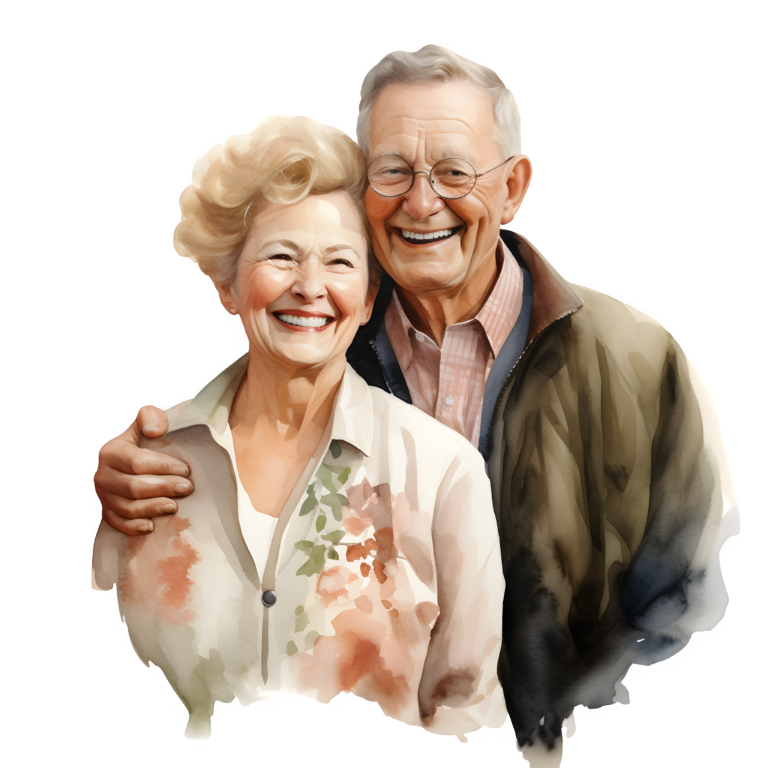What’s a Super-Ager and Why Would You Want to be One?

Super-ager describes men and women ages 70 and above who have the mind and body of someone decades younger. Unlike their counterparts, who may see a decline in their mental and/or physical capacities, super-agers seem to hold steady.
I wanted to explore this topic because I will be 70 in just over two years. My husband is 9 years older. I have observed a decline in both his physical and mental capacities, much more than is typical for his age. I believe that had he taken more preventive measures, his quality of life would be significantly better today!
When people think of super-agers they may think of the men and women living in Okinawa Japan. Studies have been conducted on how and why Okinawans surpass other communities and live well into their 100’s. The findings may not surprise you. Okinawans and other centenarians have things in common that help them maintain healthy minds and bodies. Some of those commonalities include-
- Diet
- Exercise
- Social circle
- Mindfulness
- Sleep routine
In 2018, over 93,000 people over the age of 100 were living in America. That’s 0.02% of the elderly population. These numbers are growing rapidly. Living a long and healthy life is possible, and with intentionality, you can increase your chances of becoming a super-ager as well.
Why Would You Want to be a Super-Ager?
Being a super-ager isn’t just about the quantity of candles on your cake. It’s about the quality of your daily life. Super agers seem to defy aging and stay mentally and physically sound which makes their twilight years richer, healthier, and more independent.
You may not be able to stop time, but you can control how your mind and body respond as you grow older. Maintaining both mental and physical fitness is something that can dramatically improved the quality of your life as you age.
Can Anyone be a Super-Ager?
While genetics play a role in super-ager status, there are actions anyone can take to enhance their chances of aging healthily. Many activities leading to super-ager status are the same activities that help improve overall health.
- Prevent illness
- Reduce stress
- Boost immunities
- Increase personal happiness
So, yes, anyone can do their part to be a super-ager. Even if you don’t live to be 100, taking the steps to ensure your life is healthier and happier will certainly make every year you have the best it can be.
Super Agers Decline More Slowly
We begin to age the moment we are born. Humans grow more the first years of life than any other. They also deteriorate in the last years of life faster than any other. There’s a tipping point, usually around the thirties, where many people reach their peak physically. That’s generally when the aches and pains of life start to make themselves known. We don’t bounce back from a night on the town quite as easily or recover from an injury as rapidly.
It’s Not Normal to Decline
We all face mortality. While aging and dying are normal, experiencing a decline in health during midlife that leads to diseases in later years is not. It’s not inevitable that we all lose our mental faculties and mobility.
The decline as we age isn’t necessarily age-related but health-related. We don’t hit a magic number and develop clogged arteries and forgetfulness. These issues result from many factors unrelated to age, such as:
- What we eat
- How much we exercise
- How often we challenge our minds
- Whether we maintain friendships
These lifestyle choices significantly influence our aging process. While we cannot stop the passage of time, we can make healthier choices to maintain our well-being as we age. It’s normal to age, but rapid decline is often a consequence of controllable lifestyle factors.
The Real Reason Your Senses Fade as You Age…and What to Do About it!
One of the issues of aging is the change in our senses. All five senses are affected as we age. Our senses are aroused by stimulus in the environment. The threshold that triggers our senses increases over time. This can affect your vision, hearing, taste, smell and touch.
When we are stimulated, signals are sent to our brain by nerves that trigger the appropriate reaction. When we are younger, it doesn’t take much to stimulate our senses. As we age it takes more for our senses to be heightened.
Each of our senses can be affected by age. Some typical ways our senses fade include-
Changes in vision – Our eyes physically change as we age. The pupil reduces in size, sharpness diminishes, and eye muscles can weaken. Disorders like glaucoma, cataracts, and macular degeneration become possible. We may lose clarity close up or farther away.
What to do about it – Take care of your eyes. See the optometrist regularly and get screened for disorders. Wear sunglasses when you’re outside and don’t strain your eyes with blue light from computers, tablets, and smartphones.
Hearing loss – It’s common to lose the ability to pick up quiet noises or hear clearly. People who have worked in industries with loud repetitive noise may experience a decrease in hearing sooner than average.
What to do about it – Protect your ears. Use earplugs or noise cancelling headphones to reduce noise. Do not expose yourself to prolonged bouts of loud noise. Keep your ears clean from wax and debris. Do not damage your ear by cleaning too deep or scratching.
Did you know? Your ear is responsible for your balance. Your inner ear sends signals to the brain to help keep balance when standing and sitting. Age can affect that signal and lead to imbalance and falls.
Diminished taste and smell – Taste and smell go together, and your tongue has nearly 10,000 taste buds that diminish over time. This affects your ability to sense sweet, salty, sour, bitter, and umami flavors. Smell is also important for safety, alerting you to smoke or other dangers.
What to do about it – Many things can cause diminished taste and smell. Start by seeing your doctor to help diagnose why you may be losing sensation. They can find a treatment to help reduce or diminish your loss of taste and smell.
Changes in touch- The sense of touch alerts you to temperature, pressure, and pain. When these triggers diminish, you risk pressure sores, frostbite, and not realizing when you are hurt.
What to do about it – You can prevent loss of sensation by maintaining a healthy circulatory system. Aerobic exercise can help keep your blood pressure stable which will help with blood flow to limbs and organs.
Your senses are at risk as you age. Taking precautions to keep them sharp and healthy will significantly improve your quality of life as you grow older.
While we’ve learned that aging is normal, it doesn’t mean you must decline. As populations grow and our environment impacts our lives, the risk of diseases, disorders, and illnesses increases.
We’ve learned that it’s normal to age, but that doesn’t mean you must decline. The larger the population grows and the more our environment impacts our lives, the higher the risk of large groups of people developing diseases, disorders, and illnesses as they age.
Our Bodies Age Physically
Our bodies age over time. A moderately healthy and active person will begin to see a 10% decrease in their aerobic capacity each decade after they reach 30. So, if you don’t take steps to increase or maintain cardiovascular health, you can expect to see a 30% decrease by age 60. Thankfully, those who engage in 20-40 mins of cardio exercise per day can prevent the decrease and, even at age 80, have the stamina and cardiovascular health of someone decades younger.
Our bodies can get stiff with age too. Leading a more sedentary lifestyle can affect bone density, flexibility, and stamina. People who stay active and move daily can help themselves stay limber, flexible, and less likely to experience falls. Also, eating well can help reduce inflammation in the body that contributes to aches and pains.
Our Minds Age Along with Our Bodies
Our minds age alongside our bodies. Just as our physical health can deteriorate, our brains can lose mass and functionality. Concerns about aging often focus on the fear of losing cognitive abilities. It’s vital to recognize the various forms of dementia that can affect both mind and body.
Society Makes It Scary to Age
We live in a society that covets independence and places great value on being able to take care of ourselves. Asking for help or living in an interdependent way with family isn’t normal in American culture. Becoming older and losing mobility or intellect is a great fear among the aging population who must live with the changes, as well as the families who are challenged with supporting their loved ones as they age. For many people, moving into an assisted living or other facility for the elderly is the only option when they can no longer care for themselves independently. It’s rare for families to care for their elderly relatives in their own homes for a wide range of reasons.
Aging Doesn’t Have to Be Scary
Getting older doesn’t have to be a jump off the high dive into the deep end of the geriatric pool. Super agers take control of the things they can while making room for the things they can’t. This helps you live intentionally rather than reacting to getting older after something bad has happened.
Important ways to take charge of your later years include:
Planning for retirement at an early age
Eating right and maintaining a good weight
It’s Essential to Stay Active at Every Age
Getting annual physicals and checkups
Having a will, advanced directive, and DNR
Coordinating your plans with family
Many people wait until something happens to make a plan. They key is to have a plan for a range of possibilities and make resources available and get buy-in from your support system.
Do what you can to stay physically and mentally healthy as well as prepare and share your thoughts about how you’d like help or care in the future should you need it. Engaging in regular physical activity is crucial for maintaining both physical and mental health as we age.
3 Things Super-Agers Have in Common
Social and medical science has been paying close attention to super agers world-wide. They are trying to pinpoint what factors contribute to aging well into the 70’s, 80’s, and 90’s with the minds and bodies of people decades younger.
Their data has shown that regardless of where they live, super-agers have things in common. Things like-
- Healthy Diet
- Regular Exercise
- Being Part of a Community
While these things may be expressed differently based on where people live, overall super agers tend to eat great, get plenty of exercise, and have a healthy community of friends and family. These factors work together to create a healthy environment to flourish at any age.
All Super-Agers Eat Healthy Foods
First off, there are instances of bacon-eating-cigar-smoking super-agers, but most people living well into their later years, follow a healthier diet. When super-agers have been studied, they discovered that most super-agers have a common eating style that is low in salt, fat, and sugar. Their diets contain little red meat, oil, or processed foods.
Some regions where there are higher numbers of super-agers, such as Sardinia, follow a standard Mediterranean diet. This diet is filled with healthy fats from olive oil, fish, and nuts, as well as a wide variety of vegetables, legumes, and other foods native to their area.
Other regions such as Japan, rely on healthy grains like rice, oily fish, and fermented soy products. These regional foods make a healthy impact on super-ager status. In America many of these foods are also readily available making it possible to adopt a Mediterranean or Okinawan diet.
All Super-Agers Move their Bodies
Second, it’s a myth that you have to be of Olympic status to become a super-ager. On the contrary, super-agers don’t have to be elite athletes to be physically fit. In some regions, like Costa Rica, many super-agers work physical type jobs that keep them naturally physically fit. Other regions like Japan use martial arts to stay limber and fit.
Cardiovascular exercise is specifically beneficial for heart health, which contributes to brain health too. Strength training helps maintain strong bones and connective tissues. Stretching helps keep stiff joints and muscles loose and supple.
All Super-Agers Have Connections
The third thing super-agers have in common is a network of friends and family who keep them stimulated socially. Being socially active helps keep the brain healthy. Having places to go and people to see helps keep the body active. Engaging in critical thinking, laughing, and having someone to share life with helps prevent isolation which can lead to anxiety, depression, and more.
Super-agers have unique qualities that help them age well with their minds and bodies intact, but they also have some basic things in common. Knowing that diet, exercise, and social engagement are all things super-agers have in common should encourage you that anyone has the potential to be a super-ager under the right conditions.
Before you Fight Aging with Surgery, Try These Tips Instead
With advanced medical options available today, it’s possible to counteract signs of aging. While surgical interventions can effectively address aging signs, there are also non-invasive alternatives that can be just as effective.
Tip: Take better care of your skin
Tip: Increase your water intake
Tip: Maintain your weight
You can avoid surgery by taking skin care seriously- Your skin is the largest organ on your body. It has an important job to protect everything inside your body, keep you cool, and filter toxins. When it comes to anti-aging skin care is at the top of the list. Fine lines and wrinkles are normal signs of aging, but many people experience skin changes much sooner than they have to and could avoid many common skin conditions, including cancer, by taking precautions.
Take your skin care seriously while you’re young. Get educated about your personal skin care needs and follow the guidelines carefully. From sunscreen to proper moisturizers, taking care of your skin can prevent the desire for surgery down the line. Using natural Body Oils, Face Serums and Soaps can help keep your skin looking as younger and at it’s best for much longer than you may have thought possible.
Water is the key to staying youthful- Most people do not drink enough water. Proper hydration goes farther than most people realize when it comes to preventing premature aging. Water is vital for moisturizing the skin as well as keeping cells hydrated. Water aids in digestion and washes toxins from the body.
Find out the recommended daily amount of water you need for your body weight. Consume foods with high water content and add water to each meal. Be sure to increase your water consumption if you sweat during the summertime or while you exercise.
Your weight gain and weight loss could affect how you age- Gaining and losing weight again and again can be hard on your body. When your skin stretches with weight gain, it loses its elasticity over time. When you lose weight, your skin may not bounce back. This can cause loose and sagging skin which many people try to correct with surgery.
Rather than relying on surgery to tighten skin, stick to a healthy and consistent weight. Yo-yo diets can also increase the risks for heart disease, diabetes, and other internal diseases.
While surgery definitely has an important place in staying healthy, youthful, and in correcting malformations and injuries, it isn’t the only way to fend off aging. You can do your part by taking great care of your skin, drinking proper amounts of water each day, and maintaining a stable weight.

Super-Aging is a Whole-Body Experience
Depending on your personal focus, hearing the term super-aging will trigger very specific thoughts. For instance, if you covet having a healthy body, super-aging may make you think about living a long life free from falls and injuries. If you connect super-aging with cognitive abilities, you may automatically think about maintaining your memory for your lifetime. The thing is, super-aging is a whole-body experience. That’s because when you take care of your mind you are also taking care of your body and when you take care of your body, your brain benefits too.
Studies Show Exercise Benefits the Brain
A study was done on men and women aged 55 and older who were beginning to experience signs of mental decline. They were divided into two groups and given specific exercise tasks to see if they improved memory, thinking, and other cognition. Half the group did strength training and half the group did cardio exercise.
Both groups did see an increase in their ability to memorize, solve puzzles and complete tasks, but the group that participated in cardio also saw a reduction in the shrinkage of their brains.
Cardio exercise improves blood flow to the brain. It also triggers chemicals that enhance learning, thinking, and mood. In this way, being physically fit helps the brain stay healthy and may help fight against age-related dementia.
Our Mind Influences our Bodies
Our minds are powerful and interconnected with our bodies. How we think and feel influences our mood, choices, and how we experience the world. Taking care of the mind helps motivate us to take care of our bodies. Having a healthy brain and a healthy mindset are important for keeping disciplined and determined to make the right choices for longevity.
Studies have shown that relaxing can help reduce blood pressure. Relieving depression can help boost immunities. Our minds have a direct impact on our health and aging. While exercise is a chief way to keep the body and its many systems healthy, the mind has exercises that will help too. Meditating, being optimistic, and maintaining a pleasant personality are non-impact exercises for your brain that have a large impact on your body.
Super-aging is a whole-body experience. Whether your focus is mental clarity or physical fitness, you can’t get by without one affecting the other. That’s great news. No matter what your hoping to achieve through meditation or running a marathon, both your mind and your body will benefit which could lead to super-ager status.
Some Related Posts You May Enjoy:




